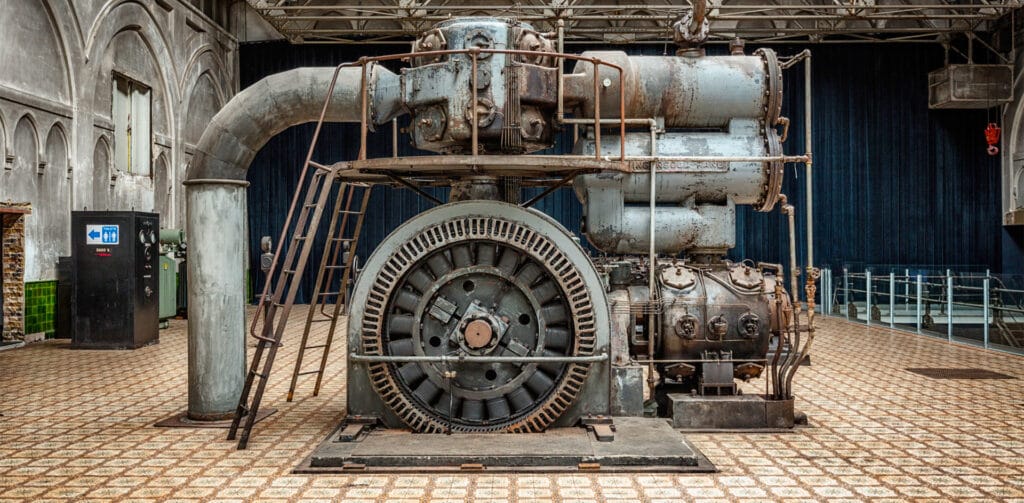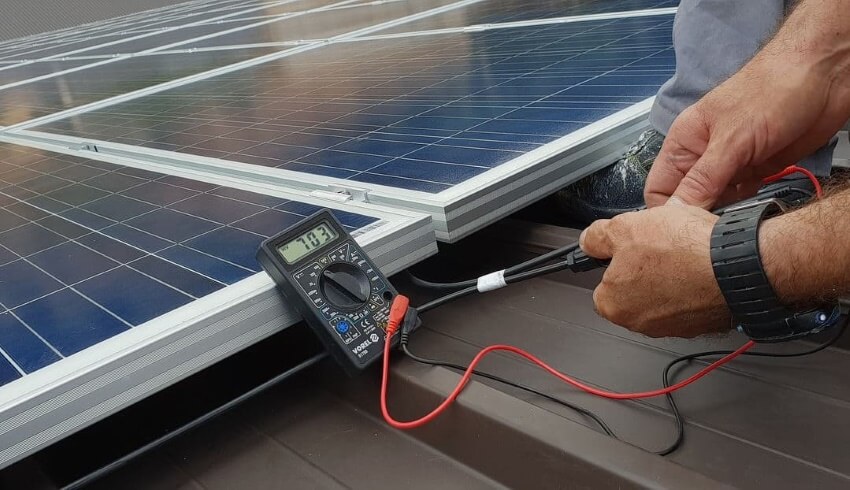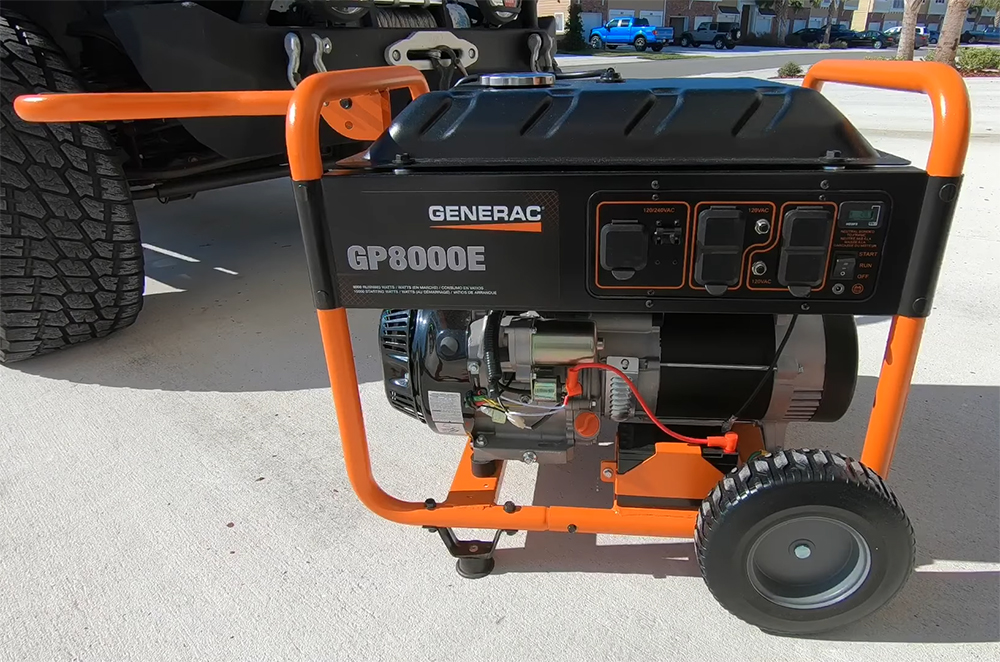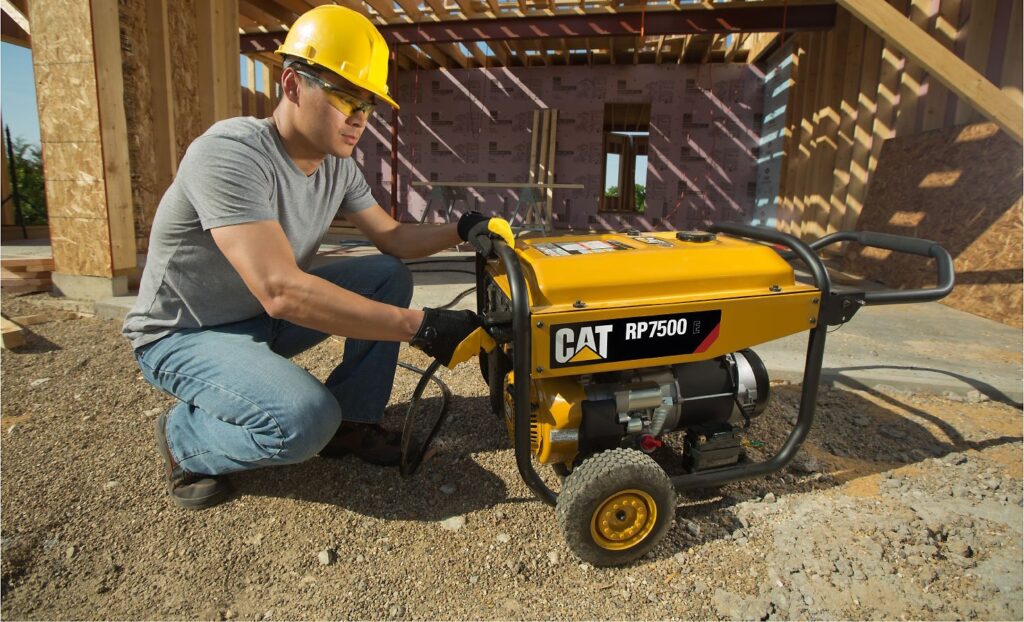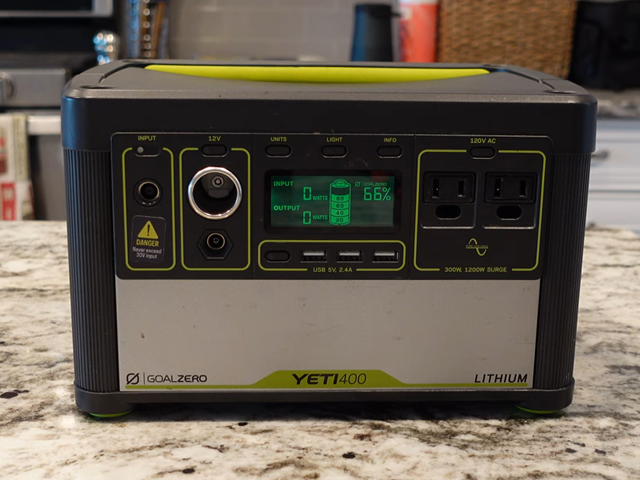
Honda and Champion are two of the most popular generator producers. Both companies make high-quality generators, but they have different strengths. Honda generators prioritize reliability, durability, and noise reduction. The company is renowned for producing generators that make almost no noise and last for decades. Champion, on the other hand, focuses on creating more affordable and versatile offerings. The company has a number of dual fuel models, as well as RV-friendly portable generators.
Choosing between Honda vs Champion generators can be a tough decision. Ultimately, it comes down to how much you’re willing to spend and what features are most important to you. In order to help you better understand the differences between these two brands, we’ll dive into an in-depth comparison between Honda and Champion. We’ll also take a head-to-head look at three competing pairs of generators from the two companies to see how they stack up.
Honda has been producing generators since 1965, making it one of the more established players in the generator industry. The company has engendered something of a cult following as a result of the quality of its engines. Many Honda users describe themselves as lifetime Honda customers and point to Honda generators that they’ve used for more than 10 years without issues.
Champion, by the standard of Honda, is a newcomer into the world of generators. The company was founded in California in 2003. But, it hasn’t taken long for Champion to find its own devoted customer base. The company has sold more than 2.5 million generators in the past 15 years.
Although Champion and Honda produce a number of generator models that directly compete with each other, the two companies take entirely different approaches to their generators. Honda generators are premium units, with premium price tags. Their main selling proposition is that a genuine Honda engine will last for a decade or more if treated well. So, the initial sticker shock is somewhat offset by the fact that you won’t have to buy another generator anytime soon.
Champion generators are significantly more affordable. But, don’t take that as a sign that they’re cheaply built or unreliable. Champion customers generally stand by the company’s units. Given Champion’s much shorter history, it’s too early to say whether these less expensive generators can typically last as long as their Honda counterparts.
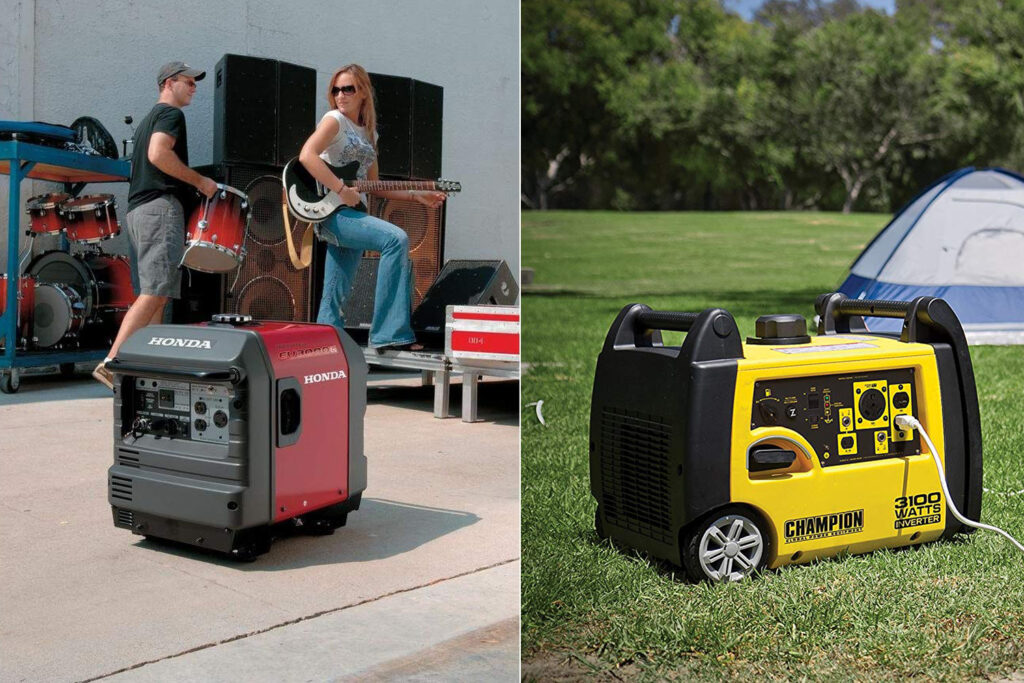
Champion generators don’t coalesce around a single feature in the same way. Some Champion models attract users with dual fuel capabilities, meaning that they can run on either gasoline or propane. Other generators in the Champion lineup feature RV-ready outlets or digital hour meters to improve their ease of use. This variability makes it somewhat hard to pin down what Champion is best at. It also means that you need to be careful to match the features you want to the power you need when looking at Champion generators.
One additional difference between Honda and Champion that’s worth noting is in the two companies’ warranty policies. Honda provides a blanket three-year warranty on all of its generators, no matter whether you’re using it for residential or commercial purposes. It’s the kind of top-notch warranty you’d expect from a company known for making long-lived generators. Champion matches the three-year warranty period for residential users, but only provides a somewhat skimpy 270-day warranty for commercial users.
With those differences between Honda and Champion in mind, let’s take a closer look at some of the competing generator offerings from these two companies.
| Honda EU2200i | Champion Power Equipment 100402 | |
| Type | Inverter | Dual-fuel inverter |
| Peak watts | 2200W | 2000W (gasoline) / 1600W (propane) |
| Rated watts | 1800W | 1800W (gasoline) / 1440W (propane) |
| Engine | OHC, 4-stroke, single cylinder | Single-phase, 4-stroke, OHV |
| Displacement | 121cc | 80cc |
| Fuel tank | 0.95 gal. | 1.1 gal. |
| Run time | 8.1 hrs (1/4 load) | 11 hrs (gasoline, 1/4 load), 24 hrs (propane, 1/4 load) |
| Outlets | (2) 120V Household; (1) 12V DC | (1) 120V 20A Duplex (5-20R); (1) 12V DC Automotive |
| Start type | Recoil | Recoil |
| Noise level | 48–57 dBA | 53.0 dBA |
| Dimensions | 20.0 x 11.4 x 16.7 in | 20.5 x 12.6 x 16.9 in |
| Weight | 46.5 lbs | 47.6 lbs |
| Warranty | 3-year limited (residential and commercial) | 3-year limited (residential), 270-day limited (commercial) |
| VIEW ON AMAZON | VIEW ON AMAZON |
The Honda EU2200i and the Champion 100402 are these companies’ offerings in the popular and highly competitive 2,000-watt inverter generator category. Both generators offer 1,800 watts of continuous power, but the Honda offers 200 watts of additional surge power over the Champion generator. The engine specifications are largely similar between the two models, although the Honda’s displacement volume is somewhat larger at 121cc.
What’s exciting about the Champion generator, though, is that it’s a dual fuel inverter generator. That means it can run on either gasoline or propane as the fuel source. Just beware that you lose a significant amount of power when running on propane – you’re limited to 1,600 watts of surge power and 1,440 watts of running power.
Although the two generators carry similar gas tanks, the Champion model has a notably larger run time. This unit can run for 11 hours at a 25% load without requiring you to refuel, whereas the Honda generator can only run for nine hours. That difference is likely in part due to lower fuel efficiency in the Honda engine as a result of its larger engine.
The outlets on the two generators are nearly identical. But, the Champion generator includes a digital hour meter, which makes it much easier to monitor your remaining run time and power usage. Both generators are designed to be transported with a single carry handle on the top of the unit, so there’s not much different there, either.
The Honda generator has a clear edge when it comes to noise production. The unit produces just 48 dB of noise – a whisper as far as generators are concerned – at a 25% load, compared to 53 dB for the Champion generator.
A lot of the decision about which of these two generators is better will come down to whether you prioritize noise or fuel flexibility. It’s also important to consider the pricing difference, as the Honda generator costs nearly twice as much as the Champion unit. For many people, that’s enough money to be a decisive factor.
| Honda EU3000IS | Champion Power Equipment 75531i | |
| Type | Inverter | Inverter |
| Peak watts | 3000W | 3100W |
| Rated watts | 2800W | 2800W |
| Engine | 4-stroke single cylinder, OHV | Single-phase, 4-stroke, OHV |
| Displacement | 196cc | 171cc |
| Fuel tank | 3.4 gal. | 1.6 gal. |
| Run time | 20 hrs (1/4 load) | 8 hrs (1/4 load) |
| Outlets | (1) 20A 125V Duplex, (1) 30A 125V Locking Plug, (1) 12V DC | (1) 120V 30A (TT-30R); (1) 120V 20A Duplex (5-20R); (1) 12V DC |
| Start type | Recoil, electric | Recoil |
| Noise level | 50–57 dBA | 58 dBA |
| Dimensions | 25.9 x 17.6 x 22 in | 18.3 x 17.3 x 22.4 in |
| Weight | 131 lbs | 83.8 gal. |
| Warranty | 3-year limited (residential and commercial) | 3-year limited (residential), 270-day limited (commercial) |
| VIEW ON AMAZON | VIEW ON AMAZON |
The EU3000IS from Honda and the 75531i from Champion are dueling 3,000-watt inverter generators. Power delivery is almost the same between the two generators, with just a 100-watt edge for the Champion model.
Honda went all out to make their 3,000-watt offering a premium generator. The unit is packed with a massive 3.4-gallon gas tank, which allows you to run the generator for 20 hours at a 25% load or nearly a full day of work at its rated capacity. On top of that, it comes with an electric push-start in addition to a backup recoil starter. The only thing that’s missing from this generator is a digital hour meter.
The Champion generator is a bit more bare bones. There’s no electric starter, and the 1.6-gallon gas tank limits you to just an eight-hour run time at a 25% load. That’s problematic, since you’ll be constantly refueling if you need to run the generator anywhere close to its rated power output. The main advantage to this generator is that the 120-volt, 30-amp twist-lock outlet is designed to be RV-ready. While the Honda unit has a similar outlet, you’ll need to purchase an RV adapter separately.
The Honda generator also blows its Champion competitor out of the water when it comes to noise production. This generator is insanely quiet – it produces just 50 dB of noise at a 25% load, making it hardly louder than the EU2200i while delivering significantly more power. The Champion generator isn’t excessively loud, at 58 dB, but it’s louder as soon as you turn it on than the Honda EU3000IS is at full power.
The only major complaint that users lodge against the Honda generator is that it’s too premium, and not portable enough as a result. The generator is quite heavy at over 130 pounds, and yet Honda didn’t build it with a decent set of wheels on the bottom. You’ll almost certainly need two people to lift and carry it. The Champion generator, on the other hand, weighs just 84 pounds, comes with easy to grab top handles, and has a set of integrated wheels.
If you’ve got the money for it, the EU3000IS leads the 3,000-watt inverter generator class in terms of quality and features. Portability can be an issue, but it’s easy to overlook in favor of how quiet this generator is. The Champion unit is hamstrung by a small fuel tank, but it’s a solid unit if you don’t mind frequent refueling stops.
| Honda EU7000iS | Champion Power Equipment 100519 | |
| Type | Inverter | Inverter |
| Peak watts | 7000W | 6250W |
| Rated watts | 5500W | 5000W |
| Engine | Air-cooled 4-stroke OHV | Single-phase, 4-stroke, OHV |
| Displacement | 389cc | 301cc |
| Fuel tank | 5.1 gal. | 4.2 gal. |
| Run time | 18 hrs (1/4 load) | 13.5 hrs (1/4 load) |
| Outlets | (2) 20A 125V GFCI Duplex; (1) 30A 125V Locking Plug; (1) 30A 125/250V Locking Plug | (1) 120/240V 30A Locking (L14-30R); (2) GFCI 120V 20A Duplex (5-20R); (1) 12V DC Automotive |
| Start type | Recoil, electric | Recoil |
| Noise level | 52–58 dBA | 69 dBA |
| Dimensions | 33.4 x 27.6 x 28.4 in | 26.6 x 25.6 x 23.7 in |
| Weight | 261 lbs | 121 lbs |
| Warranty | 3-year limited (residential and commercial) | 3-year limited (residential), 270-day limited (commercial) |
| VIEW ON AMAZON | VIEW ON AMAZON |
The Honda EU7000iS and the Champion 100519 are two of the most powerful inverter generators on the market today. The Honda in particular is a beast – it packs 7,000 watts of surge power and 5,500 watts of running power. The Champion generator isn’t far behind, with 6,500 watts of surge power and 5,000 watts of running power.
Once again, you’ll find that Honda built a bit more fuel tank into its gas-hungry generator than Champion did. But, the discrepancy between these two generators’ run times isn’t too extreme. The Honda is rated for 18 hours of use at a 25% load, compared to 13.5 hours of use at a 25% load for the Champion unit.
Honda and Champion went in slightly different directions in outfitting these two generators with outlets. Honda provided two 30-amp outlets, one of which can be toggled between 125-volt and 250-volt electricity. Champion only has one 30-amp outlet, which switches between 120-volt and 240-volt power, but added a 12-volt DC outlet that can be used for charging batteries. Honda also added an electric start to its generator, which the Champion model doesn’t have.
If you thought Honda generators were impressively quiet up to now, the EU7000iS will change your perception of generator noise entirely. This generator produces just 58 dB at full power – that’s the same amount of noise as the Champion 75531i produces at 25% load. For the wattage the Champion 100519 produces, it’s 69 dB noise production is well within the industry average. There’s just no way that Champion could reasonably compete with the EU7000iS’s mind-blowingly low noise production.
Of course, all of these features do come back to haunt the Honda generator when it comes to portability. This beastly generator weighs 260 pounds, meaning that it’s hardly portable in any meaningful sense of the word. The generator is mounted on a steel frame and a burly set of wheels, but you’ll need at least four people to lift it in and out of a vehicle. The Champion generator weighs less than half as much, while still sporting never-flat wheels and a steel frame so that you can tow it around.
If portability isn’t critical to you, the EU7000iS is hands-down the best inverter generator in its class. The low noise production for the power output is simply unparalleled by any other generator. However, the price tag and its high weight could push you in favor of the Champion 100519, which is quite impressive in its own right.
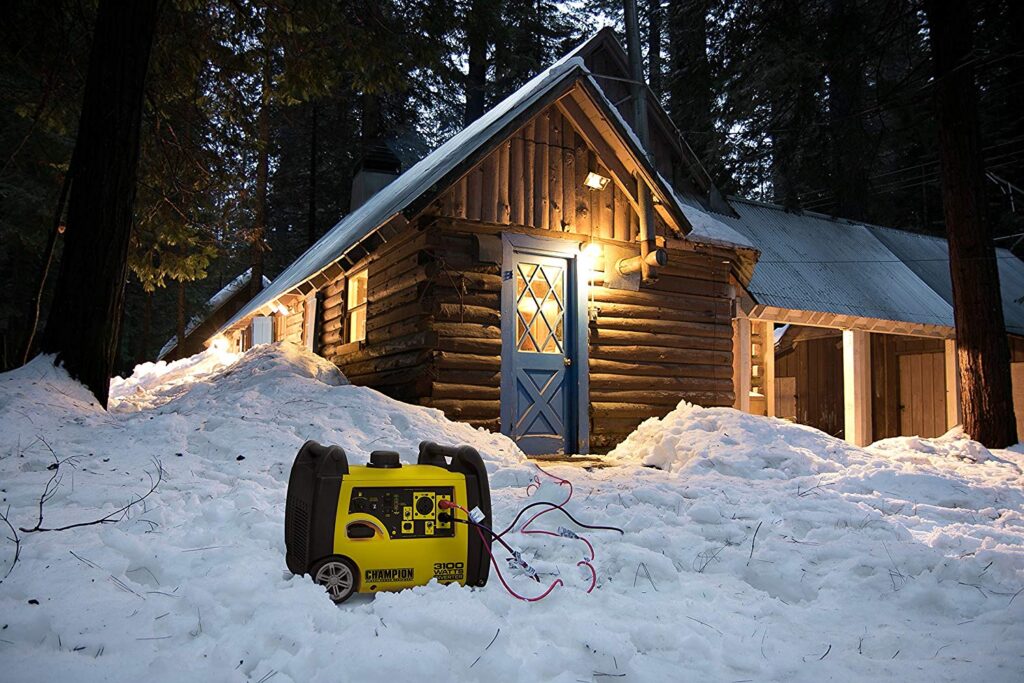
Honda is the brand of choice if keeping noise to a minimum is the most important thing to you. The company’s generators seem to defy the laws of physics with how little noise their large inverter generators, like the EU7000iS, produce. Champion simply can’t compete in this realm.
Champion generators tend to be much more portable than their Honda counterparts. For example, in both the 3,000-watt and 5,000-watt size classes, the Champion generator weighed a fraction of what its Honda competitor did. For many people, the choice between Honda vs Champion generators will also depend on what you’re willing to spend, since Honda generators come with steep price tags while Champion units are fairly affordable.
